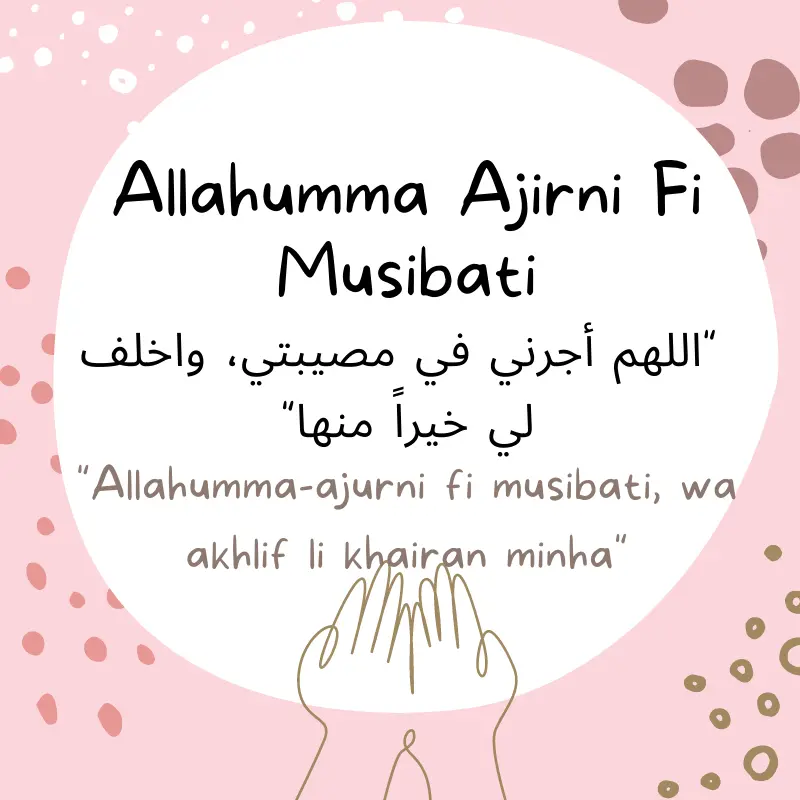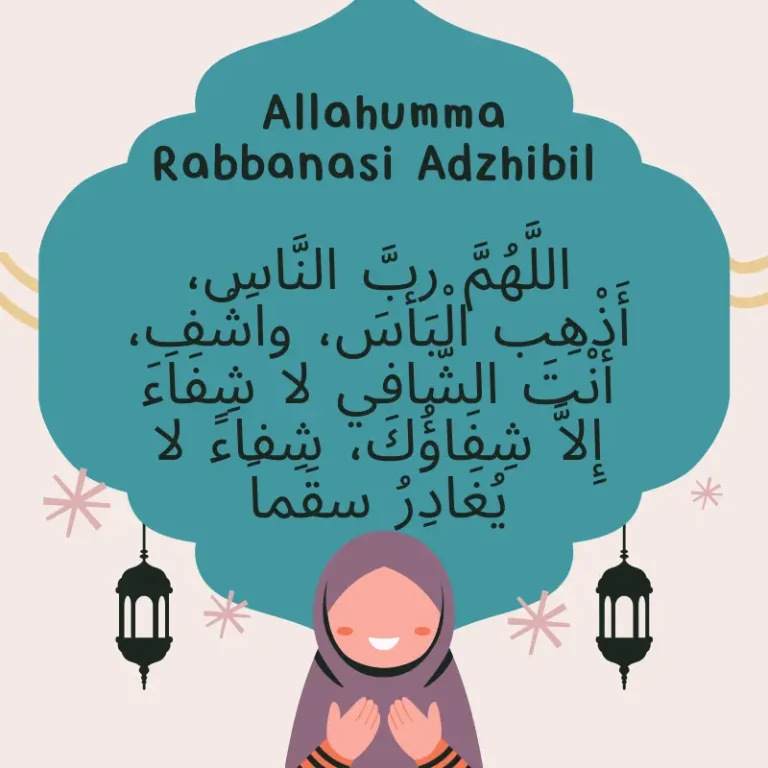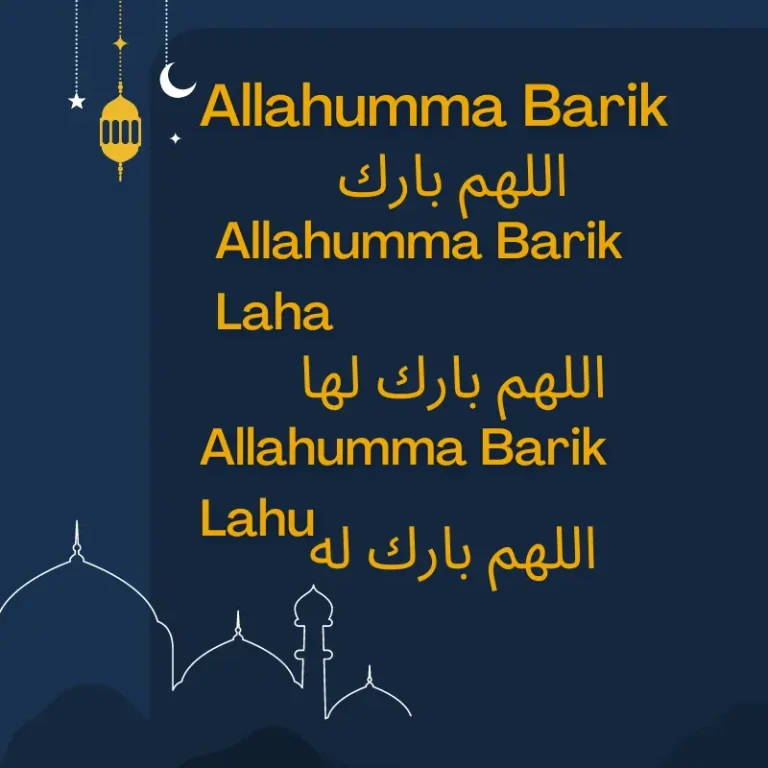Allahumma Ajirni Fi Musibati Wa Akhlif Khairan Minha Meaning
Holy Prophet (PBUH) recommends Allahumma ajirni fi musibati dua be recited in various situations; when facing adversity personal difficulties, grief and loss, personal struggles, or a calamity.
Allahumma Ajirni Fi Musibati In Arabic Text

Allahumma Ajirni Fi Musibati Transliteration in Roman
“Allahumma-ajurni fi musibati, wa akhlif li khairan minha”
Allahumma Ajirni Fi Musibati Meaning in English
“O Allah, reward me in my affliction, and replace it with something better.”
Allahumma-ajurni fi musibati this powerful invocation reflects a believer’s response to difficulties and hardships, seeking both reward and a positive outcome from Allah.
When facing a personal affliction or calamity, This Dua turns to Allah, acknowledging His ultimate control and seeking His mercy. By requesting reward in the face of hardship, one recognizes that enduring difficulties with patience and faith can lead to spiritual growth, purification, and an increase in reward from Allah.
Allahumma Ajirni Fi Musibati Hadith
Here is a hadith related to the dua “Allahumma ajirni fi musibati”: The Prophet Muhammad (peace be upon him) said:
“There is no Muslim who is afflicted with a calamity and says what Allah has commanded: ‘Inna lillahi wa inna ilayhi raji’un. Allahumma ajirni fi musibati wa akhlif li khayran minha’ (Verily, we belong to Allah and to Him we shall return. O Allah, reward me in my affliction and replace it with something better) – except that Allah will reward him for his affliction and replace it with something better.”
This hadith emphasizes the importance of invoking Allah and seeking His reward and divine intervention during times of hardship and affliction. The Prophet Muhammad (peace be upon him) assures that when a Muslim sincerely utters this supplication, acknowledging Allah’s ownership of everything and submitting to His decree, Allah will grant them reward for their patience and replace their affliction with something superior.
Believers express their trust in Allah’s wisdom and His ability to turn trials into blessings. It highlights the concept of divine recompense and teaches the importance of maintaining patience, gratitude, and reliance on Allah during challenging times. This hadith offers solace and hope to those facing difficulties, reassuring them that their patience and faith will be rewarded, and their afflictions will ultimately be replaced with better outcomes, whether in this life or the Hereafter.
It is a powerful reminder for Muslims to turn to Allah in times of distress, seeking His mercy and seeking the opportunity for spiritual growth and elevation through trials. By uttering this prayer, believers affirm their belief in Allah’s ultimate control and His ability to transform adversity into blessings, offering comfort and strength in the face of hardships.
Allahumma Ajirni Fi Musibati Wa Akhlif Khairan Explanation
Here is an explanation of this powerful prayer:
Invocation to Allah: Dua begins with addressing Allah, the Almighty and Merciful, acknowledging His sovereignty and seeking His intervention and assistance during times of affliction.
Recognition of Affliction: This prayer acknowledges the presence of personal hardship or calamity, recognizing that the individual is going through a difficult situation or trial.
Seeking Reward: By asking Allah to “ajirni fi musibati” (reward me in my affliction), the supplicant seeks not only relief from the difficulty but also requests reward from Allah for their patience, perseverance, and trust in Him during the challenging times.
Trust in Allah’s Decree: It expresses trust in Allah’s wisdom and decree, understanding that everything happens according to His divine plan. It demonstrates the believer’s reliance on Allah’s judgment and acceptance of the situation with patience and gratitude.
Hope for Something Better: Prayer continues with the request for Allah to “akhlif khairan” (replace it with something better). This expresses the desire for Allah to bring about a positive change, improvement, or a more favorable outcome as a result of the affliction.
Acknowledgment of Allah’s Power: The individual recognizes Allah’s ability to transform difficulties into blessings, to bring about positive change, and to replace hardship with something more beneficial and advantageous.
Submission and Acceptance: The believer submits to Allah’s will and accepts that He knows what is best for them. It reflects a humble attitude of acceptance and surrender to Allah’s plan, trusting that He will grant what is most suitable and beneficial.
Seeking Divine Assistance: Muslims seeks Allah’s divine help, support, and guidance in navigating through the affliction. It is an act of turning to Allah for solace, strength, and relief during challenging times.
Hope and Optimism: Dua ends with a sense of hope and optimism, as the believer trusts in Allah’s mercy, knowing that He is capable of turning hardships into blessings and replacing difficulties with something better.
Overall, this prayer encapsulates the believer’s attitude and response to adversity. It combines patience, trust in Allah, and the hope for a positive outcome.








